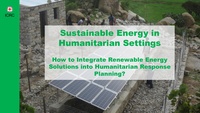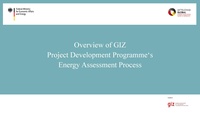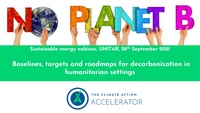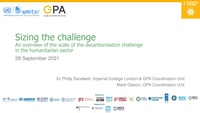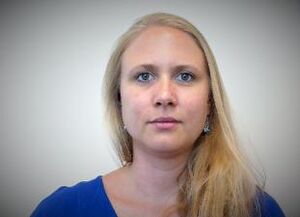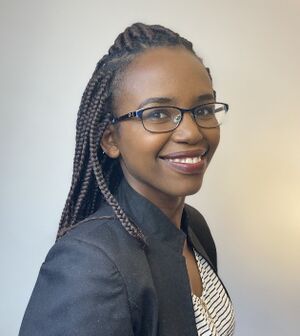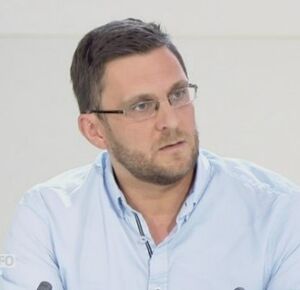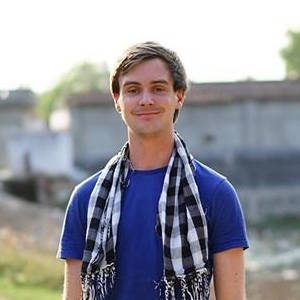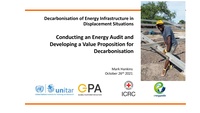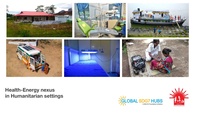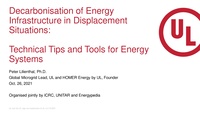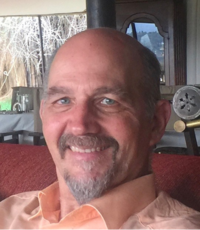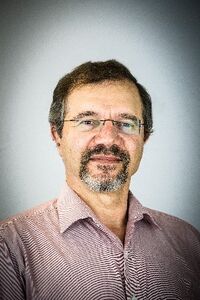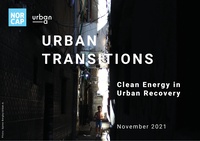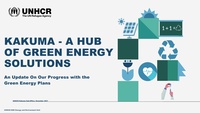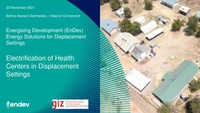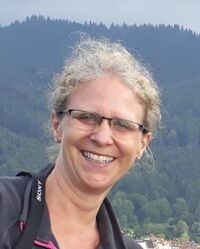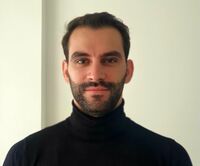Webinar Series on Decarbonisation of Energy Infrastructure in Displacement Situations
- Webinar 3: Case Studies
- Webinar 2: Technical Training
- Webinar 1: Integrate RE into Humanitarian Response Planning
Webinar: Integrate RE into Humanitarian Response Planning
What is the need for and challenges of switching to renewable energy infrastructure in the humanitarian context? This webinar focuses on the decarbonisation of energy infrastructure and the associated challenges and opportunities in the humanitarian sector. Experts will share their insights on the need and processes for decarbonisation of energy infrastructure in humanitarian responses, how to establish an organisational baseline and roadmap for emissions reductions, and share financial projections on what is needed to decarbonise the humanitarian sector.
This webinar is the first of three webinars focusing on the decarbonisation of energy infrastructure in displacement situations, taking place in September, October and November 2021. The webinars will share knowledge and good practice on how to switch from fossil fuel-based energy sources to renewable ones; provide technical tools and processes to make the transition happen; and last, but not least, share lessons learnt and experience from the ground.
Presentations
Speakers
Kathrine Alkjaersig VAG, International Committee of the Red Cross (ICRC): With over 10 years of experience as an expert in environmental management notably at DuPont Sustainable Solutions, the strategic consulting company in sustainable energy E4tech and the Netherlands Environmental Assessment Agency, Kathrine Vad is since 2017 the ICRC’s Environment and Climate Change Advisor. One of the ICRC’s strategic objectives for 2024 is to bolster the sustainability of its humanitarian response which is why in her role, Kathrine strives to enhance the ICRC’s own environmental responsibilities and to further environmental and climate change practices within the ICRC’s assistance programmes”.
Maryanne Maina, Humanitarian Settings Component - GIZ Project Development Programme Humanitarian Component: Maryanne is a sustainability professional with over 10 years’ experience working in the renewable energy, energy efficiency and climate finance sectors. She is currently a project manager within the GIZ Project Development Programme under the German Energy Solutions Initiative supporting the humanitarian sector with their objective of meeting net zero greenhouse gas emissions targets. She is also responsible for the project’s activities in Kenya and Ghana.
Bruno Jochum, Climate Action Accelerator: Bruno Jochum is the Director of the Climate Action Accelerator, a new non-for-profit initiative based in Geneva aiming to support aid and health organisations to halve their emissions by 2030, turn them into vectors of change and share climate solutions as an open source common good within a community of practice. Previously Director-General of Médecins sans Frontières Switzerland, a medical humanitarian organisation with 7,000 employees in 24 countries, he is the author of several articles on the humanitarian and aid dimensions of the climate crisis. He is a Global Fellow at the Geneva Centre for Security Policy and a regular contributor on climate at Geneva Solutions, an online media launched by Heidinews.
Philip Sandwell, Imperial College London: Dr Philip Sandwell is a Research Associate at Imperial College London and is currently seconded to the GPA Coordination Unit at UNITAR. His research focuses on techno-economic modelling and optimisation of solar minigrids, and the impacts and opportunities for decarbonisation in situations of displacement.
Webinar 2 - Technical Training and Tools for Energy System Design
This webinar provides hands-on guidance to support humanitarian energy practitioners in facilities and community services who want to transition to renewable energy sources. Our experts share their practical insights on how to conduct an energy audit and ecosystem assessment used to develop a value proposition for decarbonisation, followed by a presentation on the HOMER energy Powering Health tool - a free online model used to assess energy demand for health centres.
This webinar is part of the three-part series, Decarbonisation of Energy Infrastructure in Displacement Situations and is organised jointly by ICRC, UNITAR and Energypedia. The webinar series aims to share knowledge and good practices as well as technical tools on how to switch to renewable powered energy solutions in humanitarian settings.
Presentations
Speakers
Mark Hankins is a pioneer in rural electrification and renewable energy in East and Southern Africa for over 25 years. He has worked for private clients, the UN, the World Bank, UNIDO, the GEF, Sida, USAID, relief agencies and others. As MD of African Solar Designs, Ltd., he is a permanent resident of Kenya with both advisory and engineering skills. In the PV sector, he specializes in training, commercial market development, policy, system engineering and project development. An author of 5 books on solar energy and renewables, he has worked on off-grid and grid connect electrification projects in over 20 countries in Africa. He is currently a consultant advisor for GET.invest’s Finance Catalyst team working to providing support to solar, energy access and solar energy projects. In 2020 and 2021, he managed design and planning of off-grid solar PV systems for Norwegian Refugee Committee (in South Sudan) and IOM (in Mindanao, Philippines).
Surabhi Rajagopal, Senior Program Manager, SELCO foundation. Surabhi has been working with SELCO Foundation since 2011, on aspects of ecosystem building for energy access including financing, skill development and policy, from a Practitioner perspective. Her work includes bottom-up planning, programme design and policy engagement to integrate sustainable energy solutions for livelihood improvements and healthcare delivery, including in humanitarian settings. She has a Masters in Environmental Policy and Regulation from the London School of Economics, UK.
Dr. Peter Lilienthal is Global Microgrid Lead for UL, LLC. Previously, he was the CEO of HOMER Energy. Since 1992, he has been the developer of the National Renewable Energy Laboratory’s HOMER® hybrid power optimization software, which has been used by over 250,000 energy practitioners in 193 countries. NREL licensed HOMER Energy to be the sole world-wide commercialization licensee to distribute and enhance the HOMER model.
Dr. Lilienthal was the Senior Economist with International Programs at NREL from 1990 – 2007. He was one of the creators of NREL’s Village Power Program. He has a Ph.D. in Management Science and Engineering from Stanford University. He has been active in the field of renewable energy and energy efficiency since 1978. This has included designing and teaching courses at the university level, project development of independent power projects, and consulting to industry and regulators. His expertise is in the economic and financial analysis of renewable and micro-grid projects.
Further Information
Webinar 3: Case Studies and Lessons Learned
This webinar provides practical examples and case studies focusing on decarbonisation of energy infrastructure in the humanitarian sector. Presentations from different organizations such as GIZ and NORCAP focus on technical aspects, delivery models as well as challenges and opportunities encountered along the decarbonisation process. Examples include mini-grids projects for health centers as well as assessment of clean energy in cities in humanitarian contexts.
Presentations
Further Resources
Speakers
Bettina Baesch Ssemwaka, Head of Component Refugees, GIZ Uganda. Bettina manages two projects on energy access with focus on refugees and host communities. These seek to address the lack of sustainable energy supply in refugee hosting areas through advisory services and the implementation of measures in three main areas: 1. Improving the enabling environment for sustainable access to energy, 2. Greening UNHCR infrastructure, and 3. Sustainable, market-based energy access for households, social Institutions, and MSMEs. Bettina has a Masters of Arts in Humanitarian Assistance from the Ruhr-University in Bochum (NOHA), Germany, and holds a Masters of Law from Albert-Ludwigs-University of Freiburg, Germany and a Masters of Law from the Ministry of Justice of Stuttgart, Germany.
Synne Bergby, General Manager and Senior Analyst, Urban-A. She is an urban development professional specialised in urban analysis and planning, with rapid urban growth, migration affected cities, urban poverty, the relation between the formal and informal city, and urban crisis response as focus areas. She has more than 10 year experience, including her role as a Programme Planning Advisor to UN-Habitat Lebanon between 2013-2017.
Ms. Bergby is together with Ms. Ida Lien co-founder of Urban-A, a consultancy firm based in Oslo, Norway. The practice is based on their experience from non-governmental organisations, the UN, and private sector, with the objective to help cities prepare for, respond to and recover from emerging challenges and crises. The firm brings together experts with broad knowledge of the humanitarian and development fields to advance evidence-based, context-specific analysis and strategies. Clients include UN-Habitat, Oxfam, Danish Refugee Council (DRC), Norwegian Refugee Council (NRC), Mayors Migration Council (MMC), and the Global Alliance for Urban Crises (The Alliance).
Mustafa Almomani, UNHCR Energy & Environment Specialist, Kakuma Sub-Office - Kenya

